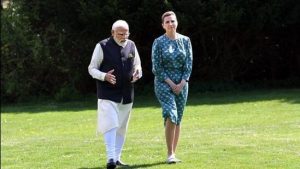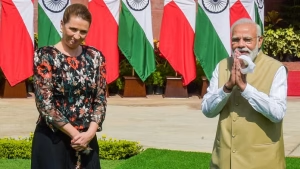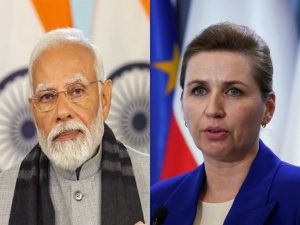New Delhi – In a significant development that further cements the robust diplomatic ties between India and Denmark, Prime Minister Narendra Modi and his Danish counterpart, Prime Minister Mette Frederiksen, engaged in a productive telephone conversation on April, 15, 2025. The high-level exchange focused on advancing the Modi-Frederiksen bilateral relations across multiple sectors while addressing pressing global issues of mutual concern.
Recalling high-level exchanges between both countries ever since the launch of the Green Strategic Partnership in 2020, the leaders noted the expansion of the Green Strategic Partnership in various fields which have created favorable conditions for Danish investments in India to contribute to green transition. The leaders also discussed regional and global issues of mutual interest.
Prime Minister Narendra Modi said that he is looking forward to the 3rd India- Nordic Summit scheduled to be held later this year in Norway, and his meeting with Prime Minister Frederiksen at that time.
Advancing the Green Strategic Partnership
The conversation highlighted the remarkable progress in Modi-Frederiksen bilateral relations since the establishment of the Green Strategic Partnership in 2020. This groundbreaking initiative has become the cornerstone of Indo-Danish cooperation, creating favorable conditions for Danish investments in India’s ambitious green transition projects.
Prime Minister Modi emphasized the transformative impact of the partnership, noting that it has evolved beyond its initial scope to encompass various domains of mutual interest. “The Modi-Frederiksen bilateral relations have created a model framework for sustainable cooperation between our nations,” sources close to the Prime Minister’s Office revealed.
The Green Strategic Partnership, launched during the virtual summit between the two leaders in September 2020, represents a unique diplomatic mechanism designed to advance climate action through concrete initiatives in renewable energy, water management, circular economy, and sustainable urban development. The Modi-Frederiksen bilateral relations have been instrumental in operationalizing this visionary partnership through regular ministerial-level engagements and technical exchanges.
Expanding Economic Cooperation
Economic cooperation formed a significant portion of the discussion, with both leaders expressing satisfaction at the growing trade and investment ties between their countries. The Modi-Frederiksen bilateral relations have facilitated substantial Danish investments in India’s renewable energy sector, water management infrastructure, and sustainable agriculture initiatives.
Danish companies have particularly focused on India’s offshore wind energy potential, bringing world-class expertise and technology to accelerate India’s clean energy transition. The Modi-Frederiksen bilateral relations have created a conducive environment for business partnerships, with Danish firms increasingly viewing India as a strategic market and manufacturing hub.
Prime Minister Frederiksen reportedly highlighted the positive experience of Danish companies operating in India, particularly appreciating the reforms undertaken to improve the ease of doing business. The Modi-Frederiksen bilateral relations have benefited from regular business forums and industry consultations that address regulatory challenges and identify new areas for collaboration.
Climate Action and Sustainable Development
Climate action continues to be at the heart of Modi-Frederiksen bilateral relations, with both leaders reaffirming their commitment to ambitious climate goals. Denmark’s expertise in green technologies and India’s scale provide complementary strengths that can accelerate global climate action.

The conversation touched upon ongoing collaborative projects in water resource management, a critical priority given India’s water security challenges. The Modi-Frederiksen bilateral relations have enabled knowledge transfer in areas such as groundwater mapping, wastewater treatment, and river restoration—areas where Denmark possesses world-leading capabilities.
Energy efficiency was another focus area, with both leaders reviewing progress on joint initiatives to reduce industrial energy consumption. The Modi-Frederiksen bilateral relations have facilitated technical partnerships between energy agencies in both countries, resulting in the implementation of Danish energy optimization models in select Indian industrial clusters.
Innovation and Research Collaboration
Research and innovation cooperation has emerged as a dynamic component of Modi-Frederiksen bilateral relations, with universities and research institutions from both countries engaging in joint projects. These collaborations span diverse fields including green hydrogen production, biofuels, sustainable agriculture, and climate-resilient infrastructure.
The conversation underscored the importance of innovation in addressing climate challenges, with both leaders expressing satisfaction at the establishment of joint research centers. The Modi-Frederiksen bilateral relations have enabled scientific exchange programs that benefit researchers from both countries while addressing shared sustainability challenges.
Digital solutions for climate action represent another promising area of cooperation, with Danish expertise in smart grid technologies complementing India’s digital infrastructure initiatives. The Modi-Frederiksen bilateral relations have created platforms for startups from both countries to collaborate on innovative climate solutions with global application potential.
Regional and Global Perspectives

Beyond bilateral issues, the conversation covered significant regional and global developments. Both leaders exchanged views on geopolitical challenges affecting Europe and Asia, reaffirming their commitment to a rules-based international order. The Modi-Frederiksen bilateral relations have consistently demonstrated alignment on key global issues, including climate action, sustainable development, and international security.
Maritime security in the Indo-Pacific region figured prominently in the discussion, reflecting Denmark’s increasing strategic interest in this vital region. The Modi-Frederiksen bilateral relations have increasingly incorporated strategic dimensions, with both countries recognizing the importance of ensuring free and open maritime commons.
Supply chain resilience was another topic of discussion, with both leaders acknowledging the lessons learned from recent global disruptions. The Modi-Frederiksen bilateral relations are evolving to address these challenges through diversified trade linkages and strategic industrial partnerships.
Looking Ahead: The Nordic Summit
A significant outcome of the conversation was Prime Minister Modi’s confirmation of his participation in the upcoming 3rd India-Nordic Summit scheduled for later this year in Norway. This important multilateral forum will provide another opportunity to strengthen Modi-Frederiksen bilateral relations while expanding India’s engagement with all Nordic countries.
“I look forward to continuing our productive dialogue at the Nordic Summit and exploring new avenues for cooperation,” Prime Minister Modi reportedly told his Danish counterpart. The Modi-Frederiksen bilateral relations will receive further impetus during this summit, which builds on the success of previous India-Nordic meetings held in Stockholm (2018) and Copenhagen (2022).
The Nordic Summit will address shared priorities including climate action, technological innovation, sustainable economic growth, and Arctic cooperation. The Modi-Frederiksen bilateral relations will form an important component of India’s broader engagement with the Nordic region, which shares India’s commitment to sustainability and multilateralism.
Historical Context of Indo-Danish Relations
The current momentum in Modi-Frederiksen bilateral relations builds upon centuries of historical connections between India and Denmark. Diplomatic relations between the two countries were established in September 1949, shortly after India’s independence, though commercial and cultural exchanges date back several centuries.
The relationship experienced a period of strain between 2011 and 2018 due to legal issues related to the extradition of Kim Davy, the prime accused in the Purulia arms drop case. However, the Modi-Frederiksen bilateral relations have successfully moved beyond these challenges, establishing a forward-looking partnership focused on shared priorities.
The elevation of the relationship to a Green Strategic Partnership in 2020 marked a watershed moment in Modi-Frederiksen bilateral relations, signaling both countries’ commitment to climate action and sustainable development. This unique partnership framework has since become a model for similar arrangements between India and other European nations.
Sectoral Cooperation Under the Green Strategic Partnership
The Green Strategic Partnership encompasses several priority sectors where Modi-Frederiksen bilateral relations have yielded tangible results:
Renewable Energy Collaboration
Denmark’s world-leading expertise in wind energy has been particularly valuable for India’s ambitious renewable energy targets. The Modi-Frederiksen bilateral relations have facilitated technology transfer and capacity building in wind energy assessment, grid integration of renewables, and offshore wind development.
Danish companies have established manufacturing facilities in India, contributing to the “Make in India” initiative while supporting the country’s clean energy transition. The Modi-Frederiksen bilateral relations have created a supportive ecosystem for such investments through streamlined approval processes and policy stability.
Water Management Initiatives
Water security represents another cornerstone of Modi-Frederiksen bilateral relations, with Danish expertise in water conservation, treatment, and management finding application in various Indian states. Joint projects in groundwater mapping, river basin management, and urban water supply have demonstrated the practical value of this cooperation.
“The water partnership exemplifies how Modi-Frederiksen bilateral relations translate into concrete benefits for citizens,” noted a senior official from India’s Jal Shakti Ministry. Danish technologies for water loss reduction have been successfully implemented in several Indian cities, addressing critical water scarcity challenges.
Sustainable Urban Development
Urbanization challenges have received focused attention under the Modi-Frederiksen bilateral relations, with Danish models of sustainable urban planning informing India’s smart cities mission. Collaborative projects in waste management, district cooling, and urban mobility reflect the comprehensive nature of this cooperation.
Several Indian cities have benefited from Danish expertise in integrated urban planning, which balances infrastructure development with environmental considerations. The Modi-Frederiksen bilateral relations have facilitated city-to-city partnerships that enable knowledge exchange between municipal authorities.
Agricultural Cooperation
The agricultural sector represents another significant dimension of Modi-Frederiksen bilateral relations, with focus on sustainable farming practices, food processing technologies, and agricultural research. Danish expertise in dairy technology has been particularly relevant for India’s dairy industry, the world’s largest milk producer.
Food safety and standards form another area where Modi-Frederiksen bilateral relations have yielded valuable outcomes, with Danish regulatory approaches informing India’s evolving food safety framework. Collaborative research in climate-resilient agriculture addresses shared concerns about food security in a changing climate.
Trade and Investment Landscape
The economic dimension of Modi-Frederiksen bilateral relations has shown steady growth, with bilateral trade reaching approximately $3.5 billion. Danish companies have cumulatively invested over $1 billion in India across various sectors, particularly in renewable energy, food processing, maritime shipping, and infrastructure.
Several major Danish companies, including Vestas, Grundfos, Danfoss, and Maersk, have established significant operations in India, creating thousands of jobs while bringing sustainable technologies to the Indian market. The Modi-Frederiksen bilateral relations have prioritized addressing investment barriers and creating enabling conditions for business partnerships.
India’s exports to Denmark primarily comprise textiles, chemicals, food products, and IT services, while Danish exports to India include industrial machinery, pharmaceutical products, renewable energy equipment, and food processing technologies. The Modi-Frederiksen bilateral relations aim to diversify this trade basket while addressing non-tariff barriers.
Cultural and Educational Exchange
Beyond economic and political dimensions, the Modi-Frederiksen bilateral relations have emphasized people-to-people connections through cultural and educational initiatives. Academic partnerships between universities in both countries have expanded significantly, with joint research programs and student exchange opportunities.
The establishment of the Indian Cultural Centre in Copenhagen has enhanced awareness of Indian heritage and contemporary arts in Denmark. Similarly, Danish cultural initiatives in India have introduced Danish literature, cinema, and performing arts to Indian audiences. These cultural bridges strengthen the foundation of Modi-Frederiksen bilateral relations by fostering mutual understanding.
Educational cooperation forms another vital component of Modi-Frederiksen bilateral relations, with growing numbers of Indian students choosing Denmark for higher studies, particularly in engineering, sustainable development, and design fields. Scholarship programs and institutional partnerships facilitate this educational exchange, which contributes to knowledge transfer in priority sectors.
Multilateral Cooperation
The Modi-Frederiksen bilateral relations extend to various multilateral forums where both countries support each other’s initiatives and share similar perspectives. Climate action represents a primary area of multilateral alignment, with both India and Denmark demonstrating leadership in international climate negotiations.


Denmark has supported India’s International Solar Alliance and Coalition for Disaster Resilient Infrastructure, recognizing their importance in global climate action. Similarly, India has appreciated Denmark’s leadership role in various sustainability initiatives within the European Union and United Nations framework. This multilateral dimension adds strategic depth to Modi-Frederiksen bilateral relations.
Arctic cooperation represents an emerging area where Modi-Frederiksen bilateral relations intersect with broader geopolitical considerations. India’s Observer status in the Arctic Council and Denmark’s territorial interests in Greenland create opportunities for scientific collaboration on Arctic climate research—a critical domain given the Arctic’s influence on global climate patterns.
Healthcare and Pharmaceutical Collaboration
The telephone conversation between the two leaders also touched upon the growing significance of healthcare cooperation within the Modi-Frederiksen bilateral relations framework. This sector has gained particular prominence following the global pandemic experience, with both countries recognizing the value of collaborative approaches to public health challenges.
Denmark’s renowned pharmaceutical industry and India’s position as the “pharmacy of the world” create natural synergies within the Modi-Frederiksen bilateral relations. Danish pharmaceutical companies have expanded their research and manufacturing operations in India, leveraging the country’s skilled workforce and cost-effective production capabilities.
Joint research initiatives in biotechnology, vaccine development, and medical devices have emerged as promising areas within the Modi-Frederiksen bilateral relations. These collaborations combine Denmark’s cutting-edge research capabilities with India’s large-scale production capacity, potentially yielding healthcare solutions with global relevance.
Digital health represents another frontier in Modi-Frederiksen bilateral relations, with Denmark’s advanced healthcare digitization experience informing India’s ambitious National Digital Health Mission. Telemedicine solutions, health data management systems, and AI applications for healthcare have featured prominently in bilateral technology exchanges.
Public health system strengthening forms yet another dimension of Modi-Frederiksen bilateral relations in the healthcare domain. Danish expertise in universal healthcare provision and efficient hospital management has informed capacity-building initiatives for Indian healthcare administrators and policy makers.
The conversation reportedly included discussion on expanding pharmaceutical trade, with Indian generic medicines finding increasing acceptance in the Danish market while Danish specialized pharmaceutical products gain traction in India. This two-way exchange illustrates the evolving economic complementarities within Modi-Frederiksen bilateral relations.
Both leaders also explored possibilities for joint manufacturing of medical equipment and devices, combining Danish design and quality standards with Indian manufacturing capabilities. This initiative aligns perfectly with the “Make in India” program while strengthening the healthcare dimension of Modi-Frederiksen bilateral relations.
Pandemic preparedness emerged as a new area of focus within Modi-Frederiksen bilateral relations, with both countries committed to strengthening global health security through coordinated approaches to disease surveillance, emergency response, and medical supply chain resilience.
Challenges and Opportunities Ahead
Despite the positive trajectory of Modi-Frederiksen bilateral relations, certain challenges require continued attention. Trade barriers, including non-tariff measures and regulatory differences, still constrain the full potential of economic cooperation. Ongoing dialogue mechanisms under Modi-Frederiksen bilateral relations seek to address these issues through regular consultations.
The post-pandemic global economic realignment presents both challenges and opportunities for Modi-Frederiksen bilateral relations. Supply chain diversification efforts create new avenues for cooperation, with Danish companies considering India as an alternative manufacturing hub for certain products previously sourced from other markets.
Technological cooperation, particularly in emerging fields like artificial intelligence, quantum computing, and biotechnology, represents a promising frontier for Modi-Frederiksen bilateral relations. Both countries possess complementary strengths in these domains that could yield innovative solutions to shared challenges.
Final Word
The telephone conversation between Prime Minister Modi and Prime Minister Frederiksen demonstrates the continuing vitality of Modi-Frederiksen bilateral relations, which have expanded significantly since the establishment of the Green Strategic Partnership. This unique framework has provided strategic direction to bilateral cooperation while addressing global sustainability challenges.
The upcoming Nordic Summit will provide another opportunity to strengthen Modi-Frederiksen bilateral relations within the broader context of India’s engagement with the Nordic region. This multilateral format complements bilateral mechanisms, creating multiple channels for cooperation on shared priorities.
As both India and Denmark pursue ambitious climate targets and sustainable development goals, the Modi-Frederiksen bilateral relations serve as a model for effective international partnership that delivers concrete results while contributing to global public goods. The telephone conversation reaffirms both leaders’ personal commitment to this partnership, ensuring its continued growth and relevance.
In an increasingly complex global environment, the stability and forward-looking nature of Modi-Frederiksen bilateral relations represent a valuable diplomatic asset for both countries, combining strategic alignment with practical cooperation across multiple domains of mutual interest.

